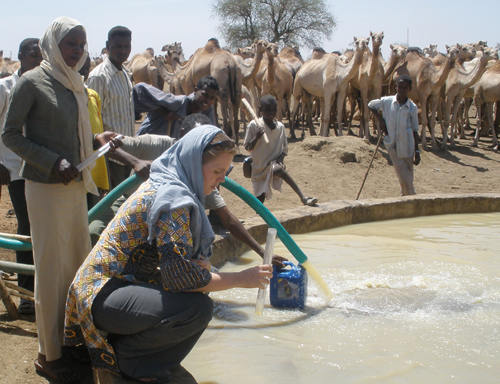
Working in a developing country is a childhood dream come true for Janna Hamilton. “I have had a strong desire since I was very young to work in developing nations in Africa,” says the Guelph engineering grad. “I want to see nations develop and move past times of crisis.”
The African country of Sudan has seen crises ranging from war to disease and hunger, but that didn’t stop Hamilton, B.Eng. ’08, from moving to northern Sudan in July 2009 to work with Medair, a Swiss non-governmental organization. “Our work is focused on relief and rehabilitation work in countries that are recovering from recent man-made or natural disasters,” she says.
As the manager of water, sanitation and hygiene, she works on various projects with Sudanese staff in South Kordofan. The projects include building and repairing water towers to improve access to safe drinking water, building latrines in communities and schools, and promoting hygiene awareness. She says accountability and sustainability are two of the biggest challenges she faces.
“Making sure that we’re being accountable to the community members we’re working with and making sure we’re working in such a way that the programs are sustainable even after we leave the area — in my mind, these are crucial to community development, and yet they are not easy to accomplish in reality.”
Access to clean water is not only vital for human survival, it could also help alleviate the conflict in Abyei, an area on the border between Sudan and South Sudan which gained independence in July 2011. “I work about four hours north of Abyei, and the increase of water points in the area where I work is one of the main strategies for stopping conflict along the border,” says Hamilton.
Despite the challenges of working in a developing country and overcoming the language barrier, Hamilton jumped at the opportunity to work with Medair. “I specifically chose the organization because of their strong commitment to values of integrity, compassion, accountability, hope, dignity and faith — values that I am committed to myself and want reflected in my work.”
She credits her studies in water resources engineering with inspiring her career path. A fourth-year project on a clay household water filter used in Cambodia opened her eyes to international water projects.
Hamilton advises students interested in international development to “recognize what values are most important to you and look for organizations to work for that match your value system.” She says joining a club or volunteering with a non-governmental organization can provide valuable experience that opens doors to future careers. As a member of the U of G chapter of Engineers Without Borders, Hamilton spent four months in Ghana, an experience she credits with putting her ahead of the competition for job interviews with international development organizations.